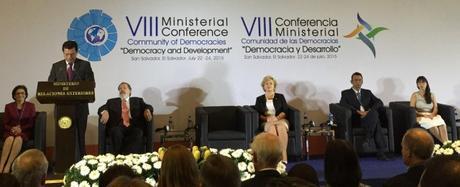
Today is the International Day of Democracy, when the world celebrates the importance of democracy and democratic governance. But the role of the private sector in building democracies that deliver prosperity and opportunity to all citizens is often overlooked. That is why the contribution made by private sector participants at the 8th Ministerial Conference of the Community of Democracies (COD) is particularly noteworthy.
The Community of Democracies was founded in 2000 as an intergovernmental coalition specifically focused on promoting democracy and democratic ideals (at the time, only 68 of 189 UN member states were democracies; today the number has risen to 84). This year’s Ministerial, which took place on July 22-24 in El Salvador, gathered representatives of civil society, parliaments, the private sector, and youth in the capital of San Salvador. The leading theme for El Salvador’s 2013-2015 presidency of the organization was “Democracy and Development.” About 800 participants from more than 70 countries attended.
The sectoral forums took place on the opening day of the Conference and met simultaneously to discuss the most urgent issues in their areas of expertise and make recommendations to the participating governments. CIPE organized a panel at the Private Sector Forum on the topic of Public-Private Dialogue (PPD), where I had the pleasure to speak along with my CIPE colleague, Director for Latin America and the Caribbean John Zemko, and a long-time CIPE partner Marina Stadthagen of Red de Empresarias de Nicaragua, who focused on the importance on empowering women entrepreneurs.
Regrettably, another CIPE partner, Mauricio Tancredi – a highly regarded representative of the Venezuelan private sector who is a past president of the National Council of Commerce and Services (Consecomercio) and a sector member of the Federation of Chambers of Commerce (Fedecámaras) – was barred from speaking on that panel without any reason or justification. CIPE and the Free Enterprise and Democracy Network (FEDN) protested this treatment by the COD Ministerial host government in a public statement issued after the Conference.
The Private Sector Forum nonetheless produced an important declaration that emphasizes the principles of dialog and corporate social responsibility as key elements of progress toward democracy and development.
The declaration states:
“We recognize the importance of public-private dialog – dedicated to strengthening spaces that permit the development of proposals and policies that enhance participation by a range of actors – in order to construct mechanisms and initiatives that lead to the equitable and sustainable growth of economies, particularly in the most vulnerable sectors.
Our interest is to contribute to the achievement of the Sustainable Development Goals as the basis for the creation of a better environment that encourages development of the productive sectors that benefit the general public.”
It also recommends, among other things, that countries should “build spaces for comprehensive dialog between the private sector and governments. These should be spaces of trust and confidence that allow for the implementation of short-, medium-, and long-term actions that are designed to respond to the demands of society and take into account the diverse actors and strategies that guarantee sustainability.”
The Declaration of the Private Sector Forum was subsequently presented to high-level government officials from around the world during the final day of the Ministerial. The text of the Declaration, both in the original Spanish version and in CIPE translation into English, is available in the latest CIPE Economic Reform Feature Service article.
Anna Kompanek is Director for Multiregional Programs at CIPE.

